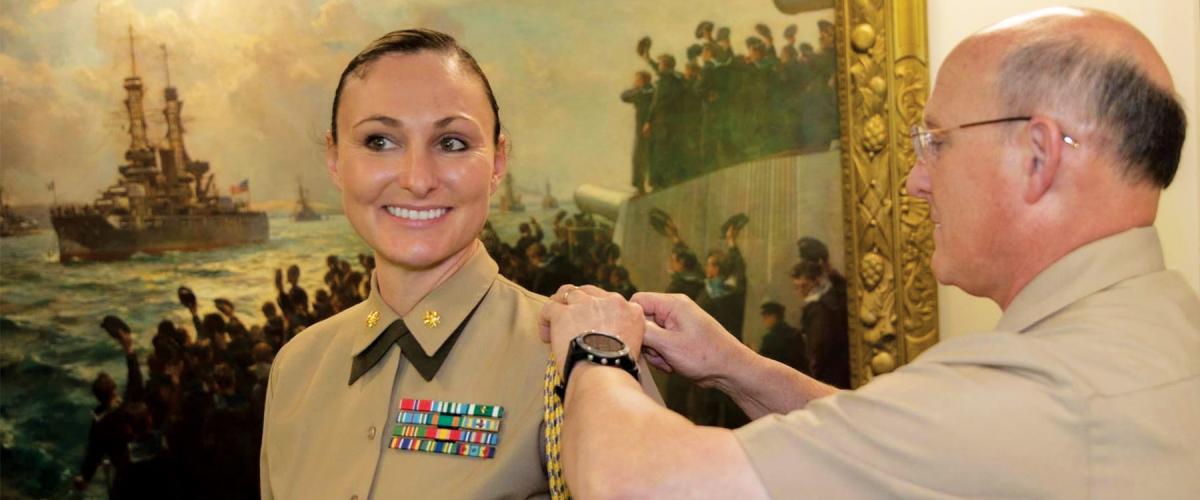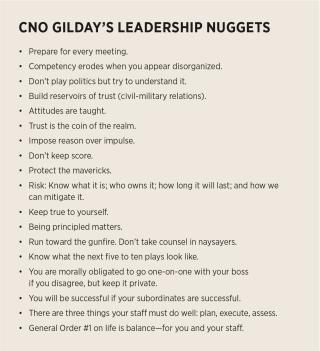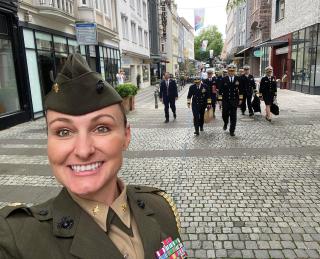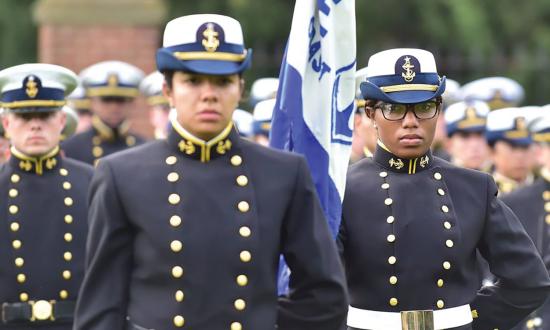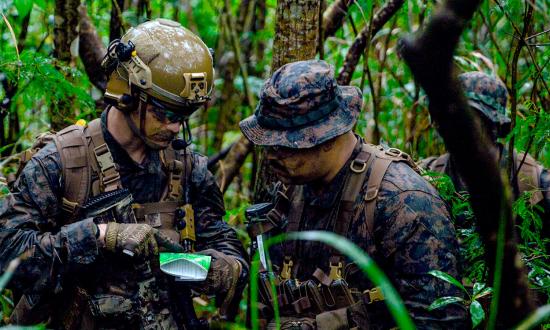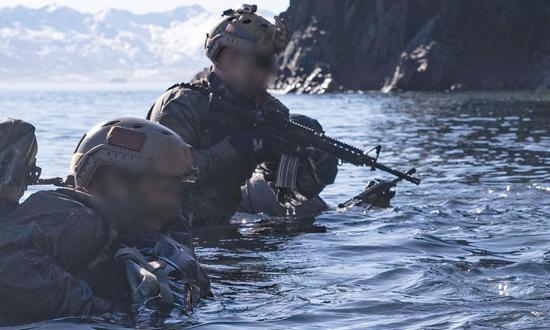Ring!
Monitor: Hey Lauren, it’s the monitor.
A monitor in the Marine Corps—like a detailer in the Navy—is the person who manages assignments.
Monitor: I know you aren’t due for orders, but Manpower Managements Officer Assignments is building a binder of nominees to be the next aide-de-camp to the Chief of Naval Operations. I’d like your thoughts on being considered.
Me: Huh? The CNO has a Marine aide?
Monitor: Yes, the CNO has two O-4s as aides—a Marine aide-de-camp, and a Navy flag aide.
That was the beginning of the curtain pulling back, and of countless eye-opening things I would learn over the next 20 months.
Wearing the Loop
During my time as the Chief of Naval Operations’ (CNO’s ) aide-de-camp (ADC), I hardly had a second to reflect on the experience. In a nutshell, it was one of the best leadership experiences for which any junior officer could hope. It provided context to tactical leadership and shed light on how policies are created, crises are managed, and strategic vision is formed. It was an insightful privilege to be the only Marine on the CNO’s personal staff during a time of renewed naval integration.
As a junior officer, I had no idea how the service headquarters elements worked or are structured, much less what it meant to wear the loop—the aiguillette worn on the left shoulder of every general and flag officer aide. I came to learn that the CNO, Commandant of the Marine Corps (CMC), and Secretary of the Navy have mirrored staffs. The current CNO’s personal staff is approximately 40 people, ranking from E-3 to the Senior Executive Service.
Every time the CNO leaves the Pentagon, the aides oversee coordination of the engagement, whether it is a local event or a multiday international trip. Typically, this means working with every element of the staff, such as the Commander’s Action Group for read-ahead material, enlisted aides for uniforms, speech writers, communications chief, NCIS agents for security and movement, public affairs for media engagements, legal for review, the pilots at VR-1 (the squadron assigned to provide executive military transport), and many others. Once planned, the aides attend the event and ensure smooth execution and always communicate back to the staff in the Pentagon (the “home team”). Of the CNO’s two aides, one of us was always planning an event or trip while the other was executing.
Here are a few reflections on what I learned about leadership at the highest level, especially for junior officers who may find themselves surprised—like I was—with an opportunity to be an aide.
Develop Good Playground Skills
Understand your role and the role of others. Become competent at your job and trust others to do theirs. There was never a time that help was more than a call away. Sometimes I stepped in other people’s lanes, put my foot in my mouth, or screwed things up, but my teammates were always there to clean up the mess or straighten me out. “Be the janitor” is a mantra the CNO’s away team adopted, meaning no one is above refilling the coffee pot or running back to the hotel to grab the forgotten gift for the ambassador. Egos were dropped at the door, and everyone understood the most important thing was supporting the CNO in leading the Navy.
Provide and Seek Feedback
Get to know your principal, to the point that you can share feedback to make the team stronger. The relationship between each principal and aide is different. Contrary to popular belief, aides do not simply carry a bag around all day. My observation is that all flag officers take a personal interest in their aides, providing great mentorship, professionally and personally. Aides are in a unique position to get to know their general or admiral as people, not just senior leaders.
One of the things I admired most about Admiral Gilday is that he sincerely wanted feedback and was always seeking to do better. Many times, when driving away from an engagement, the CNO would lean over and ask, “So what did you think?” Once, as we were leaving the Hill after an important testimony, I respectfully told him that I thought he could have used inflection to better emphasize one of his most important points. Later that night he texted me a thank you for providing candid comments and for sincerely caring about him and the Navy. These are the kinds of interactions that made the long hours and stress worth it.
Trust and Faith
In my experience, flag officers are some of our nation’s most dedicated, genuine, intelligent, and patriotic leaders. The CNO became an effective senior leader because he is a sailor at heart—not a politician. It cuts deep when people speak ill of our leaders or some aspect of the naval service. A balanced perspective is necessary to understand the myriad dynamics that influence perceived grievances. From my vantage point, there was always sound logic and reason behind decisions, even if they were not clear to the public or media. The problems and strategic initiatives leaders had to address over the past two years—COVID-19; the Red Hill pipeline fracture in Hawaii; the trilateral security pact among Australia, the United Kingdom, and the United States; the amphibious assault vehicle mishap, and others—were all handled with care and diligence. That does not mean processes are not flawed or that the bureaucracy does not have room for improvement. But based on my experience observing the CNO’s earnest efforts to get every decision right, our service’s senior uniformed leaders deserve the benefit of our trust.
Workout Every Day
Physical and mental discipline are linked. To serve for 30-plus years takes enormous discipline and stamina. The CNO always ran before work. On trips, a small group of staff would run with him. There were times I was exhausted and jet lagged, but knowing the CNO was not going to make an excuse gave me the motivation to get out of bed and run with him. During the International Seapower Symposium, we stayed at the same hotel with dozens of admirals from around the world. Every morning, the hotel gym was packed and streets filled with running admirals. That was not a coincidence.
Watch and Learn the Budget Cycle
The budget cycle, force design, acquisitions, and strategy are intricately linked. Service chiefs are responsible for building the future force. Combatant commanders are responsible for “fighting tonight.” To this point, the CNO would say, “Investments made in this decade set the stage for the next century.” He spent significant time interacting with industry to learn about future weapons and technologies, going to every U.S. shipyard to understand modernization and maintenance, and to Capitol Hill to represent and advocate for the future Navy. The CNO and CMC also spent significant time in private strategy sessions. Understanding larger Navy priorities—such as funding the sea-based component of the nuclear triad—helped me put the Marine Corps in perspective. The sooner junior officers grasp this cycle, the more effective they will be in future leadership positions.
Protocol is Essential
An aide must understand his or her principal’s position relative to others. The CNO is the head of the U.S. Navy and a member of the Joint Chiefs. What should have been obvious, but was not at first, is his role with respect to navies worldwide. The CNO’s peers are other heads of navies from partner and nonpartner nations. Leading the most powerful navy in the world, the CNO is a de-facto leader among his peers. Every two years, the U.S. Navy hosts an International Seapower Symposium (ISS). It is the most well-attended naval conference worldwide. At ISS 2021, 148 navy heads attended. There also are Regional Seapower Symposiums that the CNO always attends as a keynote speaker. Because of his prominence worldwide, the CNO has a Senior Executive Service foreign policy advisor who fills the critical role of advising the CNO on all matters pertaining to navy-to-navy relations.
Spouses are Important
Although it is not required, spouses can play a powerful role if they desire and are enabled to do so. Some spouses work full time and are rarely involved in their spouse’s military career; others spend significant time volunteering or otherwise supporting the career of their service member or unit. Neither is right or wrong. From my ADC perspective, there seemed to be a lot of pressure on flag officer spouses, yet, at the same time, restrictive legal policies guiding spouse involvement and funding. Most times, for example, when foreign heads of navies traveled to D.C. they brought their spouse, and it was expected that CNO and Mrs. Gilday would host a formal dinner—not an insignificant commitment.
Mrs. Gilday played a prominent role on international trips. Foreign counterparts often hosted the CNO as the guest of honor at a dinner or formal function, and it was typically expected that spouses would attend and bring a gift. The CNO’s trip to India in October 2021 stands out. The defense partnership with India is a top Department of Defense priority, and these navy-to-navy talks were some of the most important engagements the CNO conducted that year. The visit went extremely well, partly because Mrs. Gilday participated in a robust program with the Indian Navy spouses. The Navy should consider ways to better enable, capture, and compensate the crucial role spouses can play.
Anticipate and Act Judiciously
The staff must try to be one step ahead in anticipating what the boss will need. Certain staff will have access to the principal’s calendar and email. While back benching in meetings or waiting in a hall, constantly check the principal’s inbox and communicate with the home team back at the Pentagon. The principal needs uninterrupted space to focus on whatever meeting, speaking engagement, etc., is going on. In between meetings and events you can keep him or her informed about a critical report, Hill request, or the hot issue that came in while he or she was engaged. Be judicious about what needs action now and what can wait—not everything is an emergency.
Maintain Perspective
At the end of one long and frustrating day, the CNO and I were riding in the car. He turned to me to apologize for the day’s stress and remarked that the weight of today’s decisions can have long-term consequences, especially for sailors. He then rested his head back on the seat, sighed, closed his eyes, and fell into deep thought. I have thought about his comment again and again, and it reinforced two things. First, the importance of the warfighting profession, and how this is a critical time in history as the balance of world power is shifting. Second, the U.S. Navy, the world’s most powerful maritime service, is at the heart of great power, and every service member—seaman to CNO—is important.
By his steadfast example, Admiral Gilday taught me that our service is not about us—it is about our nation, our values, and our way of life. I will forever be a better Marine, American, and human because of my experience as his ADC. If being an aide is your next job—or even if it is not—seek lessons learned, both your own and others. Put your heart into your work, and take it all in it as you learn and witness. Even if it does not feel like it in the moment, you are contributing to the greatness of the naval service and the defense of the nation.




